| The field of the biology of morality has expanded substantially in recent decades and it is still growing. Studies have highlighted the social structure and cooperative behavior in insects, primates and other animals, from meerkats and vampire bats to naked mole rats. They have analyzed economic-styled human choices of "altruism" and selfishness in many cultures, and modeled games of cooperation, defection, punishment and group choice. Anthropologists have studied political organization and norms in hunter-gatherers and other isolated cultures, while neurophysiologists have engaged new imaging technologies to identify areas of the brain active in various forms of moral thinking. The ultra-reductionism and promotion of competition that once dominated the field (for example, E.O. Wilson's Sociobiology and On Human Nature, and Richard Dawkins' provocative-but-narrow The Selfish Gene) have, along with the rhetoric of the Cold War, yielded to more balanced perspectives and more nuanced interpretations. Even so, distortions from biological determinism still linger, most notably in evolutionary psychology. To foster better understanding among educators and to help remedy the deficit found in textbooks, then, I survey and review here a number of books available to the general reader.
Highly Recommended
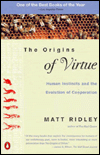 Perhaps the most approachable book, lucid and personable, is The Origins of Virtue (1996), by science writer Matt Ridley. He explains: "Our minds have been built by selfish genes, but they have been built to be social, trustworthy and cooperative. This is the paradox this book has tried to explain." It is an excellent guide to how scientists solve the central puzzle (setting aside the author's brief anti-government tirade in the final chapter). Comments about the scientists and their research further enrich understranding of the nature of science. Perhaps the most approachable book, lucid and personable, is The Origins of Virtue (1996), by science writer Matt Ridley. He explains: "Our minds have been built by selfish genes, but they have been built to be social, trustworthy and cooperative. This is the paradox this book has tried to explain." It is an excellent guide to how scientists solve the central puzzle (setting aside the author's brief anti-government tirade in the final chapter). Comments about the scientists and their research further enrich understranding of the nature of science.
 Another prime overview is Evolutionary Origins of Morality (2000), edited by Leonard Katz. This volume has hefty papers by primatologist Frans de Waal, anthropologist Christopher Boehm, philosopher-biologist duo Elliott Sober and David Sloan Wilson, and games-theorist Brian Skyrms, each summarizing their books (further profiled below). In addition to providing a healthy cross-disciplinary mix, the volume has 10 commentaries on each primary paper, profiling an informative spectrum of interpretive perspectives. This book complements the earlier Morality as a Biological Phenomenon (1978), edited by Gunther Stent, which, while the information is dated and incomplete, still serves as an effective overview of the interdisciplinary landscape. Another prime overview is Evolutionary Origins of Morality (2000), edited by Leonard Katz. This volume has hefty papers by primatologist Frans de Waal, anthropologist Christopher Boehm, philosopher-biologist duo Elliott Sober and David Sloan Wilson, and games-theorist Brian Skyrms, each summarizing their books (further profiled below). In addition to providing a healthy cross-disciplinary mix, the volume has 10 commentaries on each primary paper, profiling an informative spectrum of interpretive perspectives. This book complements the earlier Morality as a Biological Phenomenon (1978), edited by Gunther Stent, which, while the information is dated and incomplete, still serves as an effective overview of the interdisciplinary landscape.
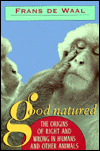 Frans de Waal's work is presented more fully in Good Natured: The Origin of Right and Wrong in Primates and Other Animals (1996). It is filled with vivid and instructive anecdotes of primate behavior, especially well suited for classrooms with a non-academic tone. De Waal focuses thematically on features that contribute to a fully developed moral system: sympathy, rank and order, quid pro quo (tit for tat), and getting along (such as reconciliation), elements that he brings together in a final commentary. In The Ape and the Sushi Master (2001), he expands his focus to address features of primate and animal culture, aiming to erode assumptions that dichotomize nature and (exclusively human) culture. Later, in Primates and Philosophers (2006), de Waal returns to interdisciplinary discourse, taking issue in particular with the notion that human morality is only a thin 'veneer' covering a selfish core. He emphasizes the deeply embedded (primate) emotions of empathy, consolation, reciprocity and fairness. (The contributions from his commentators Philip Kitcher, Peter Singer, Christine Korsgaard, and Robert Wright however, are not deeply informative.) Frans de Waal's work is presented more fully in Good Natured: The Origin of Right and Wrong in Primates and Other Animals (1996). It is filled with vivid and instructive anecdotes of primate behavior, especially well suited for classrooms with a non-academic tone. De Waal focuses thematically on features that contribute to a fully developed moral system: sympathy, rank and order, quid pro quo (tit for tat), and getting along (such as reconciliation), elements that he brings together in a final commentary. In The Ape and the Sushi Master (2001), he expands his focus to address features of primate and animal culture, aiming to erode assumptions that dichotomize nature and (exclusively human) culture. Later, in Primates and Philosophers (2006), de Waal returns to interdisciplinary discourse, taking issue in particular with the notion that human morality is only a thin 'veneer' covering a selfish core. He emphasizes the deeply embedded (primate) emotions of empathy, consolation, reciprocity and fairness. (The contributions from his commentators Philip Kitcher, Peter Singer, Christine Korsgaard, and Robert Wright however, are not deeply informative.)
Krebs and Davies' An Introduction ot Behavioral Ecology (1993) is an advanced text that is now partly dated conceptually, but is still valuable in summarizing many concrete examples.
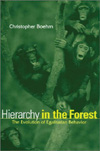 In Hierarchy in the Forest (1999), Christopher Boehm analyses egalitarian societies and the links between morality and political organization. He compares modern humans with their ancestors and closest primate relatives. Boehm claims that under appropriate conditions, 'a large, ad hoc, community-wide political coalition serves as watchdog over individual behaviors that could lead to victimization of others, or to conflict within the group' (Katz 2000, p. 80). He profiles the politics of chimps, hunter-gatherers, tribesmen and other hominoids, and surveys the preadaptations that empower moral communities, such as effective communication skills. He also underscores the role of the early human social environment in shaping further biological evolution. This highlights the importance of understanding levels of organization in biology the genetic, the organismal, the psychological, and the social and how they interact, with regulation from the "top-down" as much as by development from the "bottom-up". The framework of cultural evolution (along with its potential for shaping biological traits) is also addressed extensively in Peter Richerson and Richard Boyd's Not By Genes Alone (2005). They sketch how behavior can be transmitted culturally, highlighting the ability to mimic, or copy, in lieu of learning individually. At the same time, they appeal broadly (and often uncritically) to diffuse group selection, emphasizing in-group cohesion and out-group conflict in shaping behavior. In Hierarchy in the Forest (1999), Christopher Boehm analyses egalitarian societies and the links between morality and political organization. He compares modern humans with their ancestors and closest primate relatives. Boehm claims that under appropriate conditions, 'a large, ad hoc, community-wide political coalition serves as watchdog over individual behaviors that could lead to victimization of others, or to conflict within the group' (Katz 2000, p. 80). He profiles the politics of chimps, hunter-gatherers, tribesmen and other hominoids, and surveys the preadaptations that empower moral communities, such as effective communication skills. He also underscores the role of the early human social environment in shaping further biological evolution. This highlights the importance of understanding levels of organization in biology the genetic, the organismal, the psychological, and the social and how they interact, with regulation from the "top-down" as much as by development from the "bottom-up". The framework of cultural evolution (along with its potential for shaping biological traits) is also addressed extensively in Peter Richerson and Richard Boyd's Not By Genes Alone (2005). They sketch how behavior can be transmitted culturally, highlighting the ability to mimic, or copy, in lieu of learning individually. At the same time, they appeal broadly (and often uncritically) to diffuse group selection, emphasizing in-group cohesion and out-group conflict in shaping behavior.
Recommended
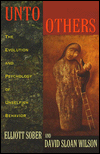 The distinction between levels of organization and their relevance for moral behavior is also explored in Sober and Wilson's Do Unto Others (1998). They distinguish, in particular, evolutionary altruism (at the genetic level) and psychological altruism (at a mental, intentional level). They, too, support to the notion of group selection, but without fully considering the role of social selection and sanctioning, which have become more prominent since they published their book. The distinction between levels of organization and their relevance for moral behavior is also explored in Sober and Wilson's Do Unto Others (1998). They distinguish, in particular, evolutionary altruism (at the genetic level) and psychological altruism (at a mental, intentional level). They, too, support to the notion of group selection, but without fully considering the role of social selection and sanctioning, which have become more prominent since they published their book.
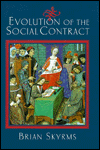 A major area of investigation has been simulations of various evolutionary strategies, to determine which are stable. Cheaters can disrupt a system of cooperators, for example, proliferate, and ultimately replace the cooperators. Brian Skyrms presents the results of many such models in The Evolution of the Social Contract (1996). A major area of investigation has been simulations of various evolutionary strategies, to determine which are stable. Cheaters can disrupt a system of cooperators, for example, proliferate, and ultimately replace the cooperators. Brian Skyrms presents the results of many such models in The Evolution of the Social Contract (1996). 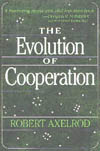 His work echoes the landmark 1984 Evolution of Cooperation, by Robert Axelrod. These works might be useful in inspiring students with computer programming skills to set up some simple simluations of their own. Alternatively, a creative teacher might find in them an occasion to develop student activities, wherein students play games in sucessive rounds based on choosing to 'cooperate' or 'defect'. Such activities might provide first-hand experience exploring various factors or assumptions, such as the ability to "punish" non-cooperators, or to opt out of the system (Novak 2006; Gόreck et al 2006; Hauert et al 2007). His work echoes the landmark 1984 Evolution of Cooperation, by Robert Axelrod. These works might be useful in inspiring students with computer programming skills to set up some simple simluations of their own. Alternatively, a creative teacher might find in them an occasion to develop student activities, wherein students play games in sucessive rounds based on choosing to 'cooperate' or 'defect'. Such activities might provide first-hand experience exploring various factors or assumptions, such as the ability to "punish" non-cooperators, or to opt out of the system (Novak 2006; Gόreck et al 2006; Hauert et al 2007).
  The modern reader will still find much of value in Darwin's original Descent of Man (1871). Darwin's theory of the origin of the moral sense, or the feeling of duty to help one's fellows (Chapter 3), drew on four elements: (1) social instincts, a product of a social species able to provide mutual benefit; (2) memory, a foundation for reflection, remorse, and conscience; (3) language, allowing each organism to communicate its needs more effectively; and (4) habit, the product of learning, which will generate immediate, unreflective responses. Darwin's work has many flaws by modern standards. Yet some comments also seem remarkably prescient for example, his hesitant speculations about group selection, considerations of punishment, or the role of social selection in fitness. It is fascinating to see how Darwin articulated the first informed approach to morality from the unique perspective of natural history. The modern reader will still find much of value in Darwin's original Descent of Man (1871). Darwin's theory of the origin of the moral sense, or the feeling of duty to help one's fellows (Chapter 3), drew on four elements: (1) social instincts, a product of a social species able to provide mutual benefit; (2) memory, a foundation for reflection, remorse, and conscience; (3) language, allowing each organism to communicate its needs more effectively; and (4) habit, the product of learning, which will generate immediate, unreflective responses. Darwin's work has many flaws by modern standards. Yet some comments also seem remarkably prescient for example, his hesitant speculations about group selection, considerations of punishment, or the role of social selection in fitness. It is fascinating to see how Darwin articulated the first informed approach to morality from the unique perspective of natural history.
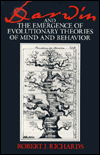 Readers with deeper historical interests may consult Robert Richards' authoritative (and award-winning) Darwin and the Emergence of Evolutionary Theories of Mind and Behavior (1987), which profiles developments in psychology, including moral thinking, in the 19th century. (The volume is valuable mostly for historians, in tracing Darwin's thinking, rather than for educators, who may be looking for a prospective conceptual trajectory that might engage modern students, say.) Richards' history of science is extended into the history of philosophy in Biology and the Foundations of Ethics (1999), edited by Jane Maienschein and Michael Ruse. The contributors are all distinguished scholars, but the volume as a whole is not well unified. Readers with deeper historical interests may consult Robert Richards' authoritative (and award-winning) Darwin and the Emergence of Evolutionary Theories of Mind and Behavior (1987), which profiles developments in psychology, including moral thinking, in the 19th century. (The volume is valuable mostly for historians, in tracing Darwin's thinking, rather than for educators, who may be looking for a prospective conceptual trajectory that might engage modern students, say.) Richards' history of science is extended into the history of philosophy in Biology and the Foundations of Ethics (1999), edited by Jane Maienschein and Michael Ruse. The contributors are all distinguished scholars, but the volume as a whole is not well unified.
Informative
Readers with strong philosophical interests may be especially concerned about evolutionary interpretations of intention, agency, or free will (at the psychological level). These are addressed in several books, none yet synoptic or comprehensive, however or simple. In The Evolution of Agency and Other Essays (2001) Kim Sterelny addresses the problem of intention. He argues, first, that there was an important shift from neural systems that respond to single stimuli, to those that integrate multiple environmental cues. He then articulates the role of preference, emerging from behavioral plasticity (afforded by learning). The result?: desires, in organisms that can truly represent their environment internally (and not "merely" respond to it). Bruce Waller looks at the implications for moral philosophy in The Natural Selection of Autonomy (1998). He claims that we share the domain of autonomy and morality with other animals and that doing so requires major revisions in our conceptions of moral objectivity and moral responsibility. In The Biology and Psychology of Moral Agency (1998), William Roffschaffer likewise uses evolutionary knowledge to reassess the philosophical concept of moral agency, leading to a multi-leveled approach, reflecting evolutionary history. Educators, take note!: these three books are not for the philosophically squeamish.
Important Views about the Limits and Cultural Context of Science
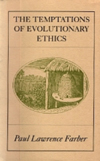 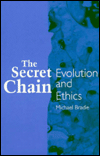 A final set of books earn mention because they help frame the limits of evolutionary approaches to morality and culture. They are mostly cautionary in tone. For example, many persons imagine that evolution might ultimately resolve the question of 'human nature' or what moral principles "really" are (or should be). A healthy check is provided both by Paul Farber's The Temptations of Evolutionary Ethics (1994) and by Michael Bradie's The Secret Chain (1994). Each discusses how trying to justify particular human values from the facts of evolution fails. Farber's book is more historical, Bradie's more philosophical. Both underscore the problem of naturalizing cultural ideologies that is, inscribing one's own cultural beliefs into nature. Richard Joyce echoes similar sentiments in The Evolution of Morality (2006), using more philosophical prose (and correspondingly less biological rigor); he concludes, characteristically, "we should reject or modify any theory that would render us epistemic slaves to the baby-bearing capacities of our ancestors" (p. 219). A final set of books earn mention because they help frame the limits of evolutionary approaches to morality and culture. They are mostly cautionary in tone. For example, many persons imagine that evolution might ultimately resolve the question of 'human nature' or what moral principles "really" are (or should be). A healthy check is provided both by Paul Farber's The Temptations of Evolutionary Ethics (1994) and by Michael Bradie's The Secret Chain (1994). Each discusses how trying to justify particular human values from the facts of evolution fails. Farber's book is more historical, Bradie's more philosophical. Both underscore the problem of naturalizing cultural ideologies that is, inscribing one's own cultural beliefs into nature. Richard Joyce echoes similar sentiments in The Evolution of Morality (2006), using more philosophical prose (and correspondingly less biological rigor); he concludes, characteristically, "we should reject or modify any theory that would render us epistemic slaves to the baby-bearing capacities of our ancestors" (p. 219).
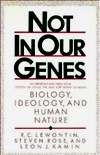 One may note the absence of books about sociobiology cited here. While these books inspired much research, their relevance is now limited, especially in interpreting human morality, as opposed to animal sociality or cooperation based on kin selection. Genetic explanations typically fall short in explaining psychological or social-level phenomena fully. The sociobiology fad is instructive historically, however. The episode illustrates the power of persistent, but misleading assumptions about biological determinism. The errors of this doctrine are profiled, along with their political context, in Richard Lewontin's Biology as Ideology (1993), Stephen Rose's Lifelines: Life Beyond the Gene (1997), and earlier in Not in Our Genes (1984), co-authored by these two and Leon Kamin. One may note the absence of books about sociobiology cited here. While these books inspired much research, their relevance is now limited, especially in interpreting human morality, as opposed to animal sociality or cooperation based on kin selection. Genetic explanations typically fall short in explaining psychological or social-level phenomena fully. The sociobiology fad is instructive historically, however. The episode illustrates the power of persistent, but misleading assumptions about biological determinism. The errors of this doctrine are profiled, along with their political context, in Richard Lewontin's Biology as Ideology (1993), Stephen Rose's Lifelines: Life Beyond the Gene (1997), and earlier in Not in Our Genes (1984), co-authored by these two and Leon Kamin.
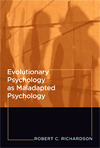 Caution may extend also to the current wave of evolutionary psychology. Robert Richardson's Evolutionary Psychology as Maladapted Psychology (2007) is a good overview of the methodological problems that generate many hasty, unjustified claims. Considerable attention has also been devoted to the 19th-century case of Phineas Gage, who lost a large section of his brain in a railway repair accident, but survived, albeit with dramatically altered moral behavior. Caution may extend also to the current wave of evolutionary psychology. Robert Richardson's Evolutionary Psychology as Maladapted Psychology (2007) is a good overview of the methodological problems that generate many hasty, unjustified claims. Considerable attention has also been devoted to the 19th-century case of Phineas Gage, who lost a large section of his brain in a railway repair accident, but survived, albeit with dramatically altered moral behavior. 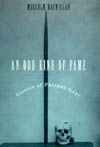 His case is examined in depth by Malcolm Macmillan in An Odd Kind of Fame: Stories of Phineas Gage (2000). Macmillan shows how the facts of the case have been repeatedly refashioned and reinterpreted, sometimes in contradictory ways, to fit different scientific ideals. Ultimately, few claims fit with what little is documented historically (including recent high-profile claims by neurophysiologist Antonio Damasio). The report by the original attending physician, John Harlow, is reproduced for reference. Ultimately, the case presents a fascinating, and sobering, lesson about the role of preconceptions in science and the potential for error valuable for understanding, and teaching about, the nature of science (Allchin 1995; 2008a). We are well advised to think critically and skeptically when biologists address culture. His case is examined in depth by Malcolm Macmillan in An Odd Kind of Fame: Stories of Phineas Gage (2000). Macmillan shows how the facts of the case have been repeatedly refashioned and reinterpreted, sometimes in contradictory ways, to fit different scientific ideals. Ultimately, few claims fit with what little is documented historically (including recent high-profile claims by neurophysiologist Antonio Damasio). The report by the original attending physician, John Harlow, is reproduced for reference. Ultimately, the case presents a fascinating, and sobering, lesson about the role of preconceptions in science and the potential for error valuable for understanding, and teaching about, the nature of science (Allchin 1995; 2008a). We are well advised to think critically and skeptically when biologists address culture.
More?
Finally, readers eager to venture deeper into the recent scientific literature may consult the scientific overview and its bibliography. Recent sources may be needed especially for addressing: findings in neurophysiology; shifting views on the roles of reason versus emotion; and debates about intentionality and deception in non-human animals. Not addressed here are other possibly relevant books on child psychology (moral development), social psychology, economic decision-making, or the general theme of emergence, systems theory and anti-reductionism.
Books to Avoid
Ideally one may like to imagine that everything written on the topic of evolution and morality is informative. Alas, the seductive drama of the subject has attracted many authors not well qualified, either biologically or philosophically(!). Blind enthuiasm for sociobiology and pop evolutionary psychology have spawned many books that play on plausibility but are uncritical and misleading. Sadly, then, I alert readers to a few books that earn negative recognition.
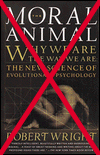 Perhaps the most disturbing is The Moral Animal (1994), by Robert Wright, who offers the credentials of a journalist, although based on the book's claims, one might surmise a rather ambitious one. Human behavior is largely reduced to competition and career moves. There is no sensitivity to social context (as in Boehm's book, say). The overall "message" is not much different than the discredited doctrines of Herbert Spencer, warmed over with modern jargon. Perhaps the most disturbing is The Moral Animal (1994), by Robert Wright, who offers the credentials of a journalist, although based on the book's claims, one might surmise a rather ambitious one. Human behavior is largely reduced to competition and career moves. There is no sensitivity to social context (as in Boehm's book, say). The overall "message" is not much different than the discredited doctrines of Herbert Spencer, warmed over with modern jargon.
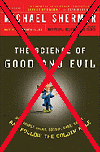 Another person who brings ostensibly good credentials to the task of discussing science and morality is Michael Shermer, editor of Skeptic magazine. Ironically, Shermer does not exhibit much skepticism on this topic, and his overt scientism leads him to an ill-founded belief that scientific facts can ground ethical principles — and can do so objectively and definitively because science ascertains how things "are." Shermer's glib text is perhaps instructive in showing how even well intentioned persons may succumb to numerous fallacies: (1) concluding that a historical (evoloutionary) process justifies the outcome (ontological fallacy); (2) believing that the course of nature is an inherent model, or source of values (naturalistic fallacy); and (3) reasoning that any universal fact is, by virtue of its universalism, thereby inevitable or "right" (universalist fallacy). While the book presents some sound science, it is never differentiated from the speculation and unwarranted extensions, and Shermer seems wholly unaware how he has tried to naturalize a cultural moral perspective — made even worse by the unqualified popularizing tone of "Science Says." Another person who brings ostensibly good credentials to the task of discussing science and morality is Michael Shermer, editor of Skeptic magazine. Ironically, Shermer does not exhibit much skepticism on this topic, and his overt scientism leads him to an ill-founded belief that scientific facts can ground ethical principles — and can do so objectively and definitively because science ascertains how things "are." Shermer's glib text is perhaps instructive in showing how even well intentioned persons may succumb to numerous fallacies: (1) concluding that a historical (evoloutionary) process justifies the outcome (ontological fallacy); (2) believing that the course of nature is an inherent model, or source of values (naturalistic fallacy); and (3) reasoning that any universal fact is, by virtue of its universalism, thereby inevitable or "right" (universalist fallacy). While the book presents some sound science, it is never differentiated from the speculation and unwarranted extensions, and Shermer seems wholly unaware how he has tried to naturalize a cultural moral perspective — made even worse by the unqualified popularizing tone of "Science Says."
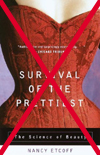 Nancy Etcoff's Survival of the Prettiest (1999), ironically subtitled 'The Science of Beauty', is also grossly misleading. It is a confused melange that tries to portray as instinct: a will to seduction, a desire to be sexy, and universal norms of attractiveness. Add to this a dash of feminism and an implicit stigma for those perceived as ugly, and you have quite a fine example of culturally tainted pseudoscience. Those wishing a primer on sexual or social selection will be better rewarded reading Volume 2 of Darwin's Descent of Man. Nancy Etcoff's Survival of the Prettiest (1999), ironically subtitled 'The Science of Beauty', is also grossly misleading. It is a confused melange that tries to portray as instinct: a will to seduction, a desire to be sexy, and universal norms of attractiveness. Add to this a dash of feminism and an implicit stigma for those perceived as ugly, and you have quite a fine example of culturally tainted pseudoscience. Those wishing a primer on sexual or social selection will be better rewarded reading Volume 2 of Darwin's Descent of Man.
Several authors succumb to the temptations that Farber cautions against. Larry Arnhart in Darwinian Natural Right attempts to claim that biological universals are "natural" and therefore desirable and even justified. However, frequency does not indicate value. Many essays in Evolutionary Ethics and Contemporary Biology (2006)(edited by Boniolo Giovanni and Gabriele De Anna) also suffer from such aspirations, as well. In Created from Animals: The Moral Implications of Darwinism (1990), James Rachels suggested that our moral duties are shaped by our relationship to other species, as shown by evolution. His claims are provocative and warrant consideration. However, the claim is really founded on an assumed value of kinship, not the facts of Darwinism. Keeping such distinctions clear is important and the casual, uncritical reader may easily slip into error.
  Finally, one may note several anti-evolution books, written by those who are ill informed about evolution and whose political motives in challenging evolution education are relatively easy to spot:
Benjamin Wiker and William Demski's Moral Darwinism: How We Become Hedonists (Intervarsity Press, 2002) and John West's Darwin Day in America: How Our Politics and Culture Have Been Dehumanized in the Name of Science (Intercollegiate Studies Institute, 2007). Such books might serve, at best, to motivate teaching the evolution of morality in every introductory biology class, with no excuse for exceptions. Finally, one may note several anti-evolution books, written by those who are ill informed about evolution and whose political motives in challenging evolution education are relatively easy to spot:
Benjamin Wiker and William Demski's Moral Darwinism: How We Become Hedonists (Intervarsity Press, 2002) and John West's Darwin Day in America: How Our Politics and Culture Have Been Dehumanized in the Name of Science (Intercollegiate Studies Institute, 2007). Such books might serve, at best, to motivate teaching the evolution of morality in every introductory biology class, with no excuse for exceptions.
Books Reviewed
- Axelrod, R.: 1984, The Evolution of Cooperation, Basic Books, New York, NY. ISBN-13 9780465005642.
- Boehm, C.: 1999, Hierarchy in the Forest: The Evolution of Egalitarian Behavior, Harvard University Press, Cambridge, MA. ISBN 0-674-39031-8.
- Bradie, M.: 1994, The Secret Chain, State University of New York Press, Albany, NY. ISBN-13 9780791421062.
- Darwin, C.: 1871, The Descent of Man, London: John Murray. URL: darwinonline.ac.uk.
- Darwin, C.: 1872/1965, The Expression of the Emotions in Man and Animals. Chicago, IL: University of Chicago Press. URL: darwinonline.ac.uk.
- Farber, P.: 1994, The Temptations of Evolutionary Ethics, University of California Press, Berkeley, CA. ISBN 0-520-21369-6.
- Joyce, R.: 2006, The Evolution of Morality, MIT Press, Cambridge, MA. ISBN -13 9780262600729.
- Katz, L.D, ed..: 2000, Evolutionary Origins of Morality: Cross-Disciplinary Perspectives, Imprint Academic, Exeter, UK & Bowling Green, OH. ISBN 090784507X.
- Lewontin, R.C.: 1993, Biology as Ideology: The Doctrine of DNA, Harper Collins, New York, NY. ISBN -13 9780060975197.
- Lewontin, R.C., Rose, S. & Kamin, L.J.: 1984, Not in Our Genes, Pantheon Books, New York, NY. ISBN )-394-72888-2.
- Macmillan, M.: 2000, An Odd Kind of Fame: Stories of Phineas Gage. Cambridge, MA: MIT Press. ISBN-13 9780262632591.
- Maienschein, J. & Ruse, M.: 1999, Biology and the Foundation of Ethics. Cambridge, UK: Cambridge University Press. ISBN-13 9780521559232.
- Richards, R.: 1987, Darwin and the Emergence of Evolutionary Theories of Mind and Behavior, University of Chicago Press, Chicago, IL. ISBN-13 9780226712000.
- Richardson, R.C.: 2007, Evolutionary Psychology as Maladapted Psychology, Cambridge University Press, Cambridge, UK. ISBN-13 9780262182607.
- Richerson, P.J. & Boyd, R.: 2005, Not By Genes Alone: How Culture Transformed Human Evolution. Chicago, IL: University of Chicago Press. ISBN-13 9780226712123.
- Ridley, M.: 1996, The Origins of Virtue, Penquin, New York, NY. ISBN 0-14-026445-0.
- Rose, S.: 1997, Lifelines: Life Beyond the Gene. Oxford, UK: Oxford University Press. ISBN-13 9780195150391.
- Rottschaefer, W.A.: 1998, The Biology and Psychology of Moral Agency, Cambridge University Press, Cambridge, UK. ISBN-13 9780521592659.
- Shermer, M. 2004. The Science of Good and Evil. New York, NY: Henry Holt.
- Skyrms, B.: 1996, Evolution of the Social Contract, Cambridge University Press, Cambridge, UK. ISBN-13 9780521555838.
- Sober, E. & Wilson, D.S.: 1998, Unto Others: The Evolution and Psychology of Unselfish Behavior, Harvard University Press, Cambridge, MA. ISBN 0-674-93046-0.
- Stent, G.S. (ed.): 1978, Morality as a Biological Phenomenon, University of California Press, Berkeley, CA. ISBN 0-520-04029-5.
- Sterelny, K.: 2001, The Evolution of Agency and Other Essays, Cambridge University Press, Cambridge, UK. ISBN
- de Waal, F.: 1996a, Good Natured: The Origins of Right and Wrong in Humans and Other Animals, Harvard University Press, Cambridge, MA. ISBN 0-674-35660-8. Pb. ISBN-13 9780674356610.
- de Waal, F.: 2001, The Ape and the Sushi Master, Basic Books, New York, NY. ISBN 0-465-04176-0.
- de Waal, F.: 2006, Primates and Philosophers: How Morality Evolved, Princeton University Press, Princeton, NJ. ISBN-13 9780691141299.
- Waller, B.: 1998, The Natural Selection of Autonomy, State University of New York Press, Albany, NY. ISBN-13 9780791438206.
*Much of this text has been published as part of Evolution: Education and Outreach, 2009, SpringerLink DOI: 10.1007/s12052-009-0173-9.
Search online booksellers: AbeBooks | Alibris | BookFinder
|